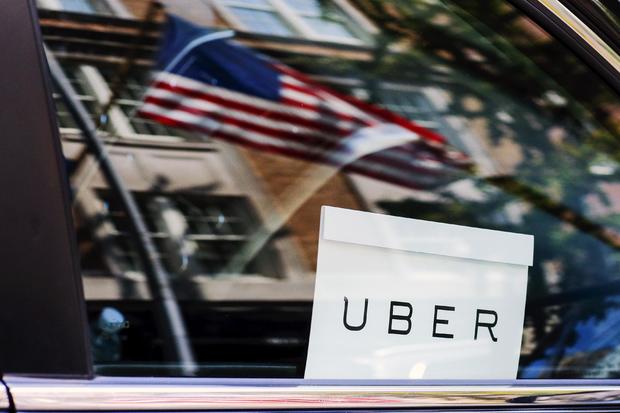Seattle considers letting Uber and Lyft drivers unionize
SEATTLE -- Seattle may soon become the first city to let drivers of ride-hailing companies such as Uber and Lyft collectively bargain over pay and working conditions, a move opposed by the companies and one seen as a test case for the changing 21st century workforce.
The city council is to vote Monday on whether to extend collective bargaining rights for drivers of taxis, for-hire transportation companies and app-based ride-hailing services that are part of the growing on-demand economy.
A national leader on workers' rights, Seattle was among the first cities to pass laws to gradually raise the minimum wage to $15 and require most employers to provide paid sick leave.
But Councilmember Mike O'Brien says for-hire drivers as independent contractors are excluded from such protections. He wants to take the next step in the fight for workers' rights and give them a say in their working conditions. Independent contractors aren't covered by the National Labor Relations Act, which allows for collective bargaining.
Many drivers in Seattle are immigrants who depend on full-time work, but some make less than minimum wage and don't have basic worker rights, such as sick leave or protection from retaliation, O'Brien said.
"This feels like the right thing to do," said O'Brien, who expects a legal fight if the measure passes. "We don't take legal challenges lightly, but we recognize that businesses sue when they disagree with our policies."
San Francisco-based Uber and others say federal labor law prevents cities from regulating collective bargaining for independent contractors, and the ordinance would violate federal antitrust laws by allowing independent transportation providers to conspire to artificially drive up transportation costs.
"The ordinance is puzzling because I think it's generally believed to be flatly illegal what they're trying to do, and I assume the courts will look at that if it were to be successful," said Uber chief adviser David Plouffe, who ran President Barack Obama's 2008 campaign, during a recent talk in Seattle.
Samuel Estreicher, a law professor at New York University, said that if the drivers aren't considered as employees under federal labor law, there's no serious argument over whether that law pre-empts the city ordinance.
He said the bigger issue concerns antitrust laws, including whether independent businesses getting together to bargain constitutes an antitrust violation.
"There's a lot of agitation over the on-demand workforce," Estreicher said. Technology has made it easier to get services from people who are not classically controlled by employers, but the concern on the labor side is whether such workers are going to be protected, he noted.
"If the Seattle ordinance survives challenge, we'll see it in a lot of cities," he added.
Lea Vaughn, a University of Washington law professor, agrees with the ride-hailing companies that federal labor law would pre-empt the city ordinance. She raised a broader issue of whether the current labor law written for an industrial economy is well-suited for the new sharing economy.
Uber is currently facing a class-action lawsuit in federal court in California over worker classification. The plaintiffs named in the suit say they are Uber employees, not independent contractors, and have been shortchanged on expenses and tips.
Uber has about 400,000 drivers nationwide with about 10,000 in Seattle. Its rival, Lyft, also has thousands of drivers in Seattle but declined to give a specific number.
"We believe the proposed ordinance threatens the privacy of drivers, imposes substantial costs on passengers and the city, and conflicts with longstanding federal law," Lyft spokeswoman Chelsea Wilson said in a statement.
Uber says drivers have flexibility in deciding when they work and how many hours, and many chose to drive to supplement their income. Drivers don't have a say in rate changes, can be deactivated at will and don't have access to worker protections such as sick leave and minimum wage laws, Dawn Gearhart, a representative with Teamsters Local 117.
Under the proposed ordinance, the city will give certified nonprofits organizations a list of eligible drivers at each company, and the groups must show that a majority of drivers of each company want representation. Those organizations would then bargain on behalf of those drivers.
Michael Palmer, 55, who has been driving for Uber for 1 ½ years, said he's divided.
"Unions always have been a good thing in any business. It helps with having a voice," said Palmer, who drives about 50 hours a week. "But I don't know if a union would work for something like Uber."
"Are we employees or partners? We don't get treated as partners," said Fasil Teka, 40, who drives part time for Uber and works full time for a for-hire company. "We have no way to negotiate with Uber."
"The only way we can achieve what we deserve as a driver is by working together," he said.
Uber has undertaken some unique ventures recently. In mid-November, Uber offered a promotion where people received free flu shots in 35 communities throughout the country.
UberHEALTH delivered wellness packs -- which included a water bottle, tissues, hand sanitizer, a lollipop, and Uber tote -- for $10 each. With the purchase of a pack, Uber users had the option to receive a flu vaccine administered by a registered nurse at no additional charge.
CBS Denver reported last week that Uber Colorado wanted to prepare its riders for National Ugly Christmas Sweater Day on Dec. 18, by delivering ugly sweaters. Uber teamed up with Tipsy Elves to offer the option of pushing a button and receiving an ugly sweater.
On Thursday, Dec. 10, Uber users in Denver, Fort Collins, Boulder and Colorado Springs were able to select "UberELVES" on the bottom slider. If an elf was available, the user could select a free Tipsy Elves sweater, one per person, and pay a $10 delivery fee.
